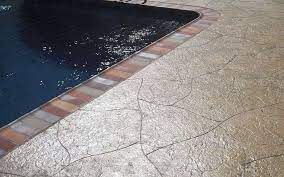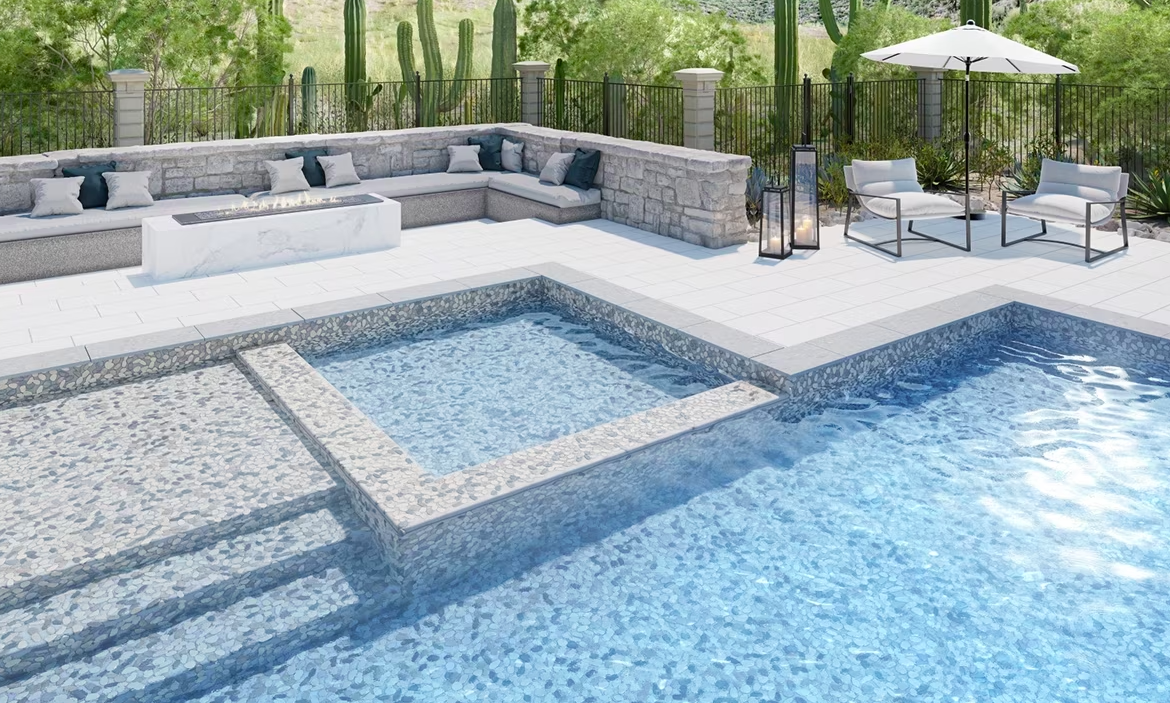You may not realize that not all cement cracks are the same. Understanding the intricacies of these cracks is crucial for effective repair. Imagine being able to fix those annoying cracks in your pool deck once and for all. With Phoenix Pool TLC’s expertise in handling different types of concrete cracks, you can rest assured that your pool deck will be restored to its former glory. But wait, there’s more to this process than meets the eye. Want to know the secret to achieving a flawless repair?
Understanding Concrete Cracks
To properly address cement cracks in your Phoenix pool, it is crucial to first understand the different types and causes of concrete cracks. Various factors can lead to cracks in your pool deck, such as ground movement, shrinkage, or poor installation. When dealing with these cracks, it’s essential to have the right tools on hand. Consider using a Phoenix pool deck crack repair kit for smaller cracks that you can fix yourself. These kits typically include everything you need to patch up minor damages efficiently.
If the cracks in your pool deck are more substantial or if you suspect a leak, it might be wise to contact Phoenix pool leak repair companies. These professionals have the expertise and equipment to identify and address more severe issues effectively. While DIY solutions can work for minor cracks, larger problems may require specialized knowledge and tools. In cases where the damage is extensive, seeking professional help is often the best course of action to ensure the longevity and safety of your pool deck.
Before starting any repairs, it’s crucial to assess the cost implications. Understanding the Phoenix concrete pool deck repair cost can help you plan your budget accordingly. While some fixes may be affordable and straightforward, others could require a more significant investment. By being aware of the potential costs involved, you can make informed decisions about the best way to tackle the cracks in your Phoenix pool deck.
Assessing the Damage
Assess the extent of damage in your Phoenix pool by thoroughly inspecting all areas for signs of cracks or structural issues. Begin your assessment by visually examining the pool surface, paying close attention to any visible cracks. Look for both small hairline cracks and larger, more significant fissures that may indicate underlying problems. Check the pool deck, walls, and floor meticulously, as cracks can appear in various locations due to different stress factors.
When inspecting the pool, consider the depth and width of the cracks. Measure them if possible, noting any areas where the cracks seem to widen or deepen. Additionally, look for signs of water leakage or moisture around the cracks, as this could signify a more severe issue. Remember to inspect the surrounding areas for any loose or crumbling concrete, which may indicate further structural damage.
Furthermore, assess the overall condition of the pool to determine if the cracks are isolated incidents or part of a more extensive problem. Take note of any areas where the concrete seems weakened or where there are signs of wear and tear. By conducting a thorough evaluation of the damage, you can better prepare to choose the right repair materials and techniques for your Phoenix pool.
Choosing the Right Repair Material
When selecting the appropriate repair material for your Phoenix pool, consider the specific characteristics of the cracks and the surrounding area to ensure effective and lasting results. Different types of cracks require different repair materials. Hairline cracks can be fixed with a simple patching compound, while larger structural cracks might need a more robust solution like hydraulic cement or epoxy injection.
For hairline cracks, opt for a vinyl concrete patch as it provides good adhesion and flexibility. This type of material is ideal for minor cracks that are not structurally compromising. It is easy to apply and dries relatively quickly, allowing you to get back to enjoying your pool in no time.
When dealing with larger cracks or structural damage, hydraulic cement is a reliable choice. This material sets rapidly and expands as it cures, ensuring a tight seal that can withstand water pressure. For even more severe cracks, epoxy injection is the go-to solution. Epoxy is a durable and waterproof material that can restore the structural integrity of your pool.
Additionally, consider the color of the repair material to ensure it blends seamlessly with your pool’s finish. Matching the color will not only provide a more aesthetically pleasing result but also help maintain the overall look of your pool. By selecting the right repair material based on the type and size of the cracks, you can effectively restore your Phoenix pool and prevent further damage.
Step-by-step DIY Repair Guide
Begin your DIY pool cement repair by thoroughly inspecting the cracks and preparing the necessary materials for the task ahead. Start by cleaning the cracked area with a pressure washer to remove any debris, dirt, or loose cement. Once the surface is clean and dry, wear safety goggles and gloves before proceeding.
Next, use a chisel and hammer to widen the cracks slightly, creating a V-shaped groove. This will allow the patching material to adhere better. Brush away any remaining debris and dust from the groove using a wire brush.
Mix the cement-based patching compound according to the manufacturer’s instructions. Apply the patching compound into the groove using a trowel, ensuring it is packed tightly and leveled with the pool surface. Smooth out the patch with the trowel, blending it seamlessly with the existing cement.
Allow the patch to cure for the recommended time, typically 24-48 hours depending on the product used. Keep the area moist during the curing process to prevent cracking. Once fully cured, sand down any rough edges with fine-grit sandpaper for a smooth finish.
Knowing When to Seek Professional Help
Inspect the repaired cracks carefully to ensure the integrity of the cement fix, particularly focusing on any signs of re-emerging damage or shifting in the pool structure. While DIY repairs can be effective for small cracks, there are instances where seeking professional help is crucial. If you notice new cracks forming shortly after your repair or if existing cracks widen or deepen, it may indicate underlying issues that require expert assessment.
Professional pool technicians have the experience and tools to identify the root cause of persistent cracks. They can conduct a thorough inspection of your pool to determine if there are structural concerns or water leakage contributing to the damage. Additionally, if you observe any significant movement in the pool walls or floor, it is advisable to consult a professional immediately to prevent potential safety hazards.
Another scenario where professional assistance is recommended is when the cracks are extensive or located in critical areas such as near the pool’s edge or in areas with heavy water flow. These situations may require specialized repair techniques to ensure the stability and longevity of the pool structure. By entrusting complex or concerning repairs to qualified professionals, you can safeguard your pool against further damage and enjoy a safe swimming environment for years to come.
Key Takeaways
- Identify types of cracks to determine appropriate repair method.
- Assess crack severity to choose suitable repair material.
- Use correct tools and techniques for effective crack repair.
- Consider DIY repair or seek professional help for complex cracks.
- Prioritize long-term solutions to prevent future damage.
Frequently Asked Questions
How Can I Prevent Cracks in My Phoenix Pool Cement?
You want to keep enjoying your Phoenix pool without worrying about cracks in the cement, right? Well, to prevent these pesky cracks, make sure you maintain proper water chemistry levels and regularly inspect and address any small cracks promptly. Also, consider investing in a good quality pool cover to protect your pool from extreme weather conditions. Taking these proactive steps will help keep your pool cement in top shape for years to come.
Is It Safe to Swim in a Pool With Cement Cracks?
Swimming in a pool with cement cracks can pose risks. Water leakage might weaken the structure, leading to potential accidents or further damage. It’s best to address the issue promptly for safety. Consider patching small cracks with appropriate materials or seeking professional help for extensive repairs. Prioritize pool maintenance to ensure a safe and enjoyable swimming experience.
Will Staining My Pool Deck Make It Slippery When Wet?
Staining your pool deck won’t turn it into an ice rink when wet. However, some stains may affect slip resistance, depending on the type and finish. To combat any safety concerns, choose a stain specifically designed for outdoor use with added slip-resistant properties. Consider maintaining a textured surface for better grip. Regular cleaning and applying a sealant can also help improve safety. Explore alternative solutions like non-slip coatings for extra protection.
Can I Use Regular Concrete for Pool Crack Repairs?
You shouldn’t use regular concrete for pool crack repairs. Opt for a specialized pool-grade cement mix designed to withstand pool water and pressure. Regular concrete may not bond properly and can lead to more cracks. Ensure a proper repair job by using the right materials for the job. Always prioritize safety and consult a Phoenix pool professional for expert advice on pool maintenance and repairs.
What Is the Average Cost of Professional Pool Cement Repairs in Phoenix?
In Phoenix, professional pool cement repairs can cost you an average of $500-$1500 per project. Factors like the extent of damage, materials used, and labor can influence the final price. It’s crucial to get multiple quotes, check for warranties, and ensure the contractor is licensed and experienced. Remember, investing in quality repairs now can save you from more significant expenses down the line.
Are There Any Warranties for DIY Pool Cement Repairs?
When it comes to DIY pool cement repairs, warranties typically do not apply. Since you’re taking on the project yourself, the responsibility for the repair falls on you. It’s important to follow proper techniques and guidelines to ensure a successful fix. Consider consulting with a Phoenix pool professional if you’re unsure about the repair process or need assistance with more extensive damage. Be proactive in maintaining your pool to enjoy a crack-free swimming experience.





